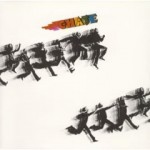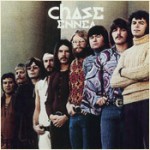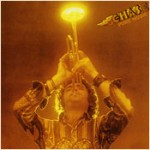You have to be of a certain era for the name Bill Chase to mean much. And it actually could mean something to you in two different contexts. Yet both contexts have an untimely limit. Bill Chase died in a plane crash on August 9, 1974, near Jackson, Minn..
 One context is a pure jazz one. In the 1960s, Bill Chase was the lead trumpet player for Woody Herman’s Thundering Herd. Then, as Miles Davis, Frank Zappa, Chicago and Blood, Sweat & Tears were fusing jazz and rock, he launched his own jazz-rock band named Chase. The band’s debut album, also called Chase, was released in 1971 and produced a single, “Get It On,” that spent 13 weeks on the charts that summer and actually reached number one. Chase (the band) quickly became one of the hottest acts in the country. In fact, the band received a nomination the Grammy Award for Best New Artist in 1972. (Carly Simon won the award.)
One context is a pure jazz one. In the 1960s, Bill Chase was the lead trumpet player for Woody Herman’s Thundering Herd. Then, as Miles Davis, Frank Zappa, Chicago and Blood, Sweat & Tears were fusing jazz and rock, he launched his own jazz-rock band named Chase. The band’s debut album, also called Chase, was released in 1971 and produced a single, “Get It On,” that spent 13 weeks on the charts that summer and actually reached number one. Chase (the band) quickly became one of the hottest acts in the country. In fact, the band received a nomination the Grammy Award for Best New Artist in 1972. (Carly Simon won the award.)
From the outset, Chase (the album) left no doubt what you were in for — a high octane and often high register performance by a seeming wall of trumpets. Although it went through various incarnations, Chase (the band) always had four trumpet players, including Chase (the musician). “Open Up Wide” opened the debut album and the title couldn’t have been more accurate. It starts with about 20 seconds of piercing trumpet riffs played, of course, by Chase (the musician) that move from channel to channel. And when I say piercing, I mean at or surpassing the level jazz fans have heard from Maynard Ferguson (with whom Chase (the musician) played and recorded for a while in the late 1950s). Quickly, though, the other three trumpets and the rhythm section jump in full throttle and you are engulfed in a cascade of sound.
 Although Chase (the band) had a vocalist to create more commercial appeal, “Open Up Wide” was an instrumental, the only one on the album. There was little doubt the album was aimed at a radio audience. Four of the seven songs — including “Get it On” — were just under three minutes in length. Two others were on either side of three and a half minutes. A five-part “suite” called “Invitation to a River” closed the recording, clocking in at just over 14 minutes. Almost every step in between is a high energy flood of brass, bass and wah-wah guitar. In fact, the album contains perhaps my favorite cover version of “Handbags and Gladrags.”
Although Chase (the band) had a vocalist to create more commercial appeal, “Open Up Wide” was an instrumental, the only one on the album. There was little doubt the album was aimed at a radio audience. Four of the seven songs — including “Get it On” — were just under three minutes in length. Two others were on either side of three and a half minutes. A five-part “suite” called “Invitation to a River” closed the recording, clocking in at just over 14 minutes. Almost every step in between is a high energy flood of brass, bass and wah-wah guitar. In fact, the album contains perhaps my favorite cover version of “Handbags and Gladrags.”
But public popularity can be short-lived. When Chase (the band) released its next album, Ennea, in 1972, it came nowhere near the sales of the debut release. There’s a couple possible reasons. First, the “hook” for the band was the brass and the growing fusion market. Ennea, though, moved a bit more toward progressive rock. There was still plenty of jazz influence and stellar trumpet playing but it seemed the recipe had been altered somehow and evidently a bit too much for the general audience. Second, although the second side of the LP is a six-song jazz suite from which the album took its name, the tunes all have names from and the lyrics are based up Greek mythology, again perhaps taking outside the ken of the average listener.
 That year, Chase (the band) went into a brief hiatus during which, unfortunately, Chase (the musician) filed for bankruptcy. Despite seemingly ongoing personnel changes and an on-again, off-again schedule, Chase (the band) did release Pure Music in early 1974. This release seemed almost a direct counterpoint to the debut release. It had more of a jazz influence than the first album. The rhythm section was more prominent part, although the four trumpets were still there. Where the debut album was made up of radio-sized pieces, none of the six songs on Pure Music were under three minutes and two exceed seven minutes. Finally, two-thirds of the songs on Pure Music were instrumentals. The two with vocals featured Jim Peterik, former lead singer for the horn band The Ides of March, who wrote one of them and co-wrote the other with Chase (the musician).
That year, Chase (the band) went into a brief hiatus during which, unfortunately, Chase (the musician) filed for bankruptcy. Despite seemingly ongoing personnel changes and an on-again, off-again schedule, Chase (the band) did release Pure Music in early 1974. This release seemed almost a direct counterpoint to the debut release. It had more of a jazz influence than the first album. The rhythm section was more prominent part, although the four trumpets were still there. Where the debut album was made up of radio-sized pieces, none of the six songs on Pure Music were under three minutes and two exceed seven minutes. Finally, two-thirds of the songs on Pure Music were instrumentals. The two with vocals featured Jim Peterik, former lead singer for the horn band The Ides of March, who wrote one of them and co-wrote the other with Chase (the musician).
The band toured in support of the new album and actually began working on another. On August 9, 1974, however, Chase (the musician) and three other members of the band chartered a plane to get to the band’s appearance at the Jackson County Fair in Jackson, Minn. The plane went down short of the runway in Jackson, killing the musicians and the pilot and co-pilot. Although a tribute album was later released, the crash brought Chase (the band) to an end. But the music has not gone away. In fact, last year all three LPs were combined on a single two-disc CD release.
In looking at the band’s catalog, some see an element of irony — or, the more gullible, an eerie foreshadowing. As noted, the debut album opened with “Open Up Wide,” written by Bill Chase. The last track on Pure Music was called “Close Up Tight,” also written by Bill Chase.
We may be runnin’ out of heroes
It seems they tumble every day
Chase, “So Many People,” Ennea








I thoroughly appreciate your thoughts on the band that I had the privilege to be a part of for 17 months.
Well, timing is everything. After 35 years, I’m releasing my private archive recordings of my time with BC. I invite you over to hear and read more about the period you describe. But from the inside.
Again, thanks for remembering. It’s folks like you that will keep the information flowing. Bill was from Boston area but the Pure Music band was predominantly prarie players (Iowa, Kansas) 😉
We’ll see you over at https://www.dartanyan.com/BillChase/chasetribute.html